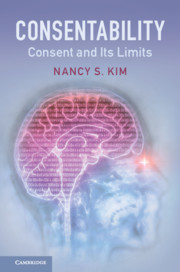Book contents
- Consentability
- Consentability
- Copyright page
- Dedication
- Contents
- Figures
- Acknowledgments
- Introduction
- Part I The Contours of Consent
- Part II Consentability and Contractability
- Part III The Regret Principle and the Opportunism Corollary: Application
- 5 Improving the Conditions of Consent
- 6 Reducing Opportunism
- 7 Revisiting the Hard Cases – Some Final Thoughts
- Conclusion
- Cases
- Statutes
- Bibliography
- Index
7 - Revisiting the Hard Cases – Some Final Thoughts
from Part III - The Regret Principle and the Opportunism Corollary: Application
Published online by Cambridge University Press: 08 February 2019
- Consentability
- Consentability
- Copyright page
- Dedication
- Contents
- Figures
- Acknowledgments
- Introduction
- Part I The Contours of Consent
- Part II Consentability and Contractability
- Part III The Regret Principle and the Opportunism Corollary: Application
- 5 Improving the Conditions of Consent
- 6 Reducing Opportunism
- 7 Revisiting the Hard Cases – Some Final Thoughts
- Conclusion
- Cases
- Statutes
- Bibliography
- Index
Summary
- Type
- Chapter
- Information
- ConsentabilityConsent and its Limits, pp. 168 - 216Publisher: Cambridge University PressPrint publication year: 2019

